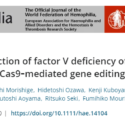IJHに大屋 周期先生の症例報告掲載されました。
- 2020.09.14 | お知らせ
Beneficial tyrosine kinase inhibitor therapy in a patient with relapsed BCR-ABL1-like acute lymphoblastic leukemia with CCDC88C-PDGFRB fusion
Abstract
BCR-ABL1-like acute lymphoblastic leukemia (ALL) is a neoplasm of lymphoblasts committed to the B-cell lineage that lack the BCR-ABL1 translocation but show a pattern of gene expression very similar to that seen in ALL with BCR-ABL1 with poor prognosis. A 22-year-old female was diagnosed with common-B-cell-ALL positive for CD10, CD19, CD22, CD79a, CD34, HLA-DR, and TdT in January 2017, and achieved complete remission (CR) with induction therapy, followed by consolidation therapy and maintenance therapy. In March 2020, 6 months after the completion of maintenance therapy, she relapsed. Inotuzumab ozogamicin (IO) was administered, and on day 28, bone marrow evaluation showed a morphologic CR. She had an HLA-identical sibling, and transplantation in her 2nd CR was planned. Because her ALL had been identified as BCR-ABL1-like ALL with CCDC88C-PDGFRB fusion, she was treated with imatinib for 2 months accompanied by 2 intrathecal methotrexate therapies, and 1 course of L-asparaginase, vincristine, and prednisolone in an outpatient setting. MRD analysis revealed potent efficacy of 2 months imatinib therapy; IgH MRD decreased from 1 × 10-2 to 1 × 10-3, and CCDC88C-PDGFRB/104ABL from 37.3 to 0. It is earnestly desired that well-designed clinical trials of TKI in ABL class-mutant BCR-ABL1-like ALL be conducted in Japan.


